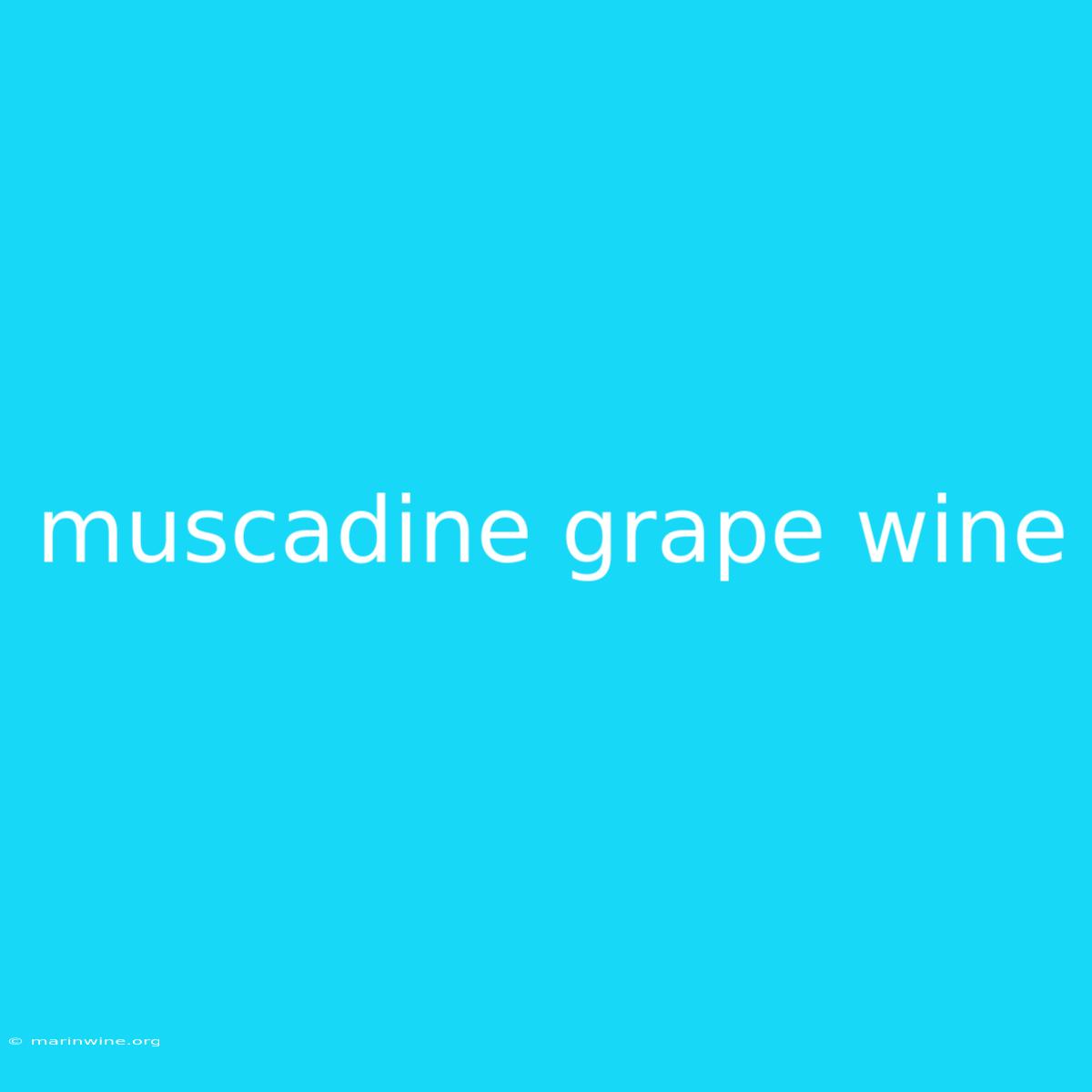Uncorking the Secrets of Muscadine Grape Wine: A Journey of Sweetness and Flavor
Have you ever wondered what makes Muscadine grape wine so unique? It's not just the sweet, rich taste; it's a world of flavor and history waiting to be explored. This article delves into the fascinating world of Muscadine grape wine, uncovering its secrets and highlighting why it deserves a place in your wine collection.
Why This Matters: Muscadine grape wine, with its distinct characteristics and growing popularity, offers a unique taste experience unlike any other. Understanding its origins, production process, and key features provides valuable insights into this captivating wine.
Key Takeaways of Muscadine Grape Wine:
| Feature | Description |
|---|---|
| Origin: | Native to the southeastern United States, particularly the Carolinas and Georgia. |
| Unique Flavor: | Sweet, fruity, with hints of blackberry, blueberry, and even pineapple. |
| High Resveratrol: | Known for its high levels of resveratrol, a powerful antioxidant. |
| Versatile Style: | Enjoyed both sweet and dry, offering a variety of options for different palates. |
| Growing Popularity: | Increasing demand due to its unique flavor profile and health benefits. |
Muscadine Grapes: A Heritage of Flavor
Muscadine grapes, the foundation of this unique wine, are prized for their distinct characteristics. These grapes, with their thick skins and high acidity, are truly unique and hold a significant place in American viticulture history.
Key Aspects of Muscadine Grapes:
- Thick Skins: Muscadine grapes are known for their thick skins, offering natural protection from pests and diseases. This feature also contributes to their high levels of resveratrol.
- High Acidity: The high acidity of Muscadine grapes balances the sweetness of the wine, creating a refreshing and complex flavor profile.
- Versatility: Muscadine grapes can be enjoyed fresh, used in jams and jellies, or transformed into delicious wines.
Discussion:
The thick skins of Muscadine grapes present a unique challenge for winemakers. The high levels of tannins can create a bitter taste if not properly managed. However, this challenge is overcome through careful winemaking techniques, resulting in a smooth, balanced, and enjoyable wine.
The Winemaking Process: Crafting a Unique Experience
The process of crafting Muscadine grape wine is meticulous, with specific steps that amplify its distinct characteristics. This process involves selecting the right grapes, fermentation, and careful aging to enhance the wine's flavor and texture.
Key Aspects of Muscadine Winemaking:
- Selection: Winemakers carefully select Muscadine grapes with the right levels of ripeness and sugar content.
- Fermentation: The fermentation process utilizes specific yeast strains to extract the unique flavors and aromas from the grapes.
- Aging: Muscadine wines are aged in oak barrels or stainless steel tanks, allowing them to develop their characteristic complexity.
Discussion:
Muscadine wines are often aged in oak barrels, contributing to the wine's rich flavor and aroma. The process of aging imparts subtle nuances of vanilla, spice, and toasted wood, adding another layer of complexity to the wine's profile.
Unveiling the Health Benefits: A Sweet Sip for Wellness
Muscadine grape wine is not just a delicious treat but also offers potential health benefits. Its high levels of resveratrol, a powerful antioxidant, have been linked to various health advantages.
Key Aspects of Muscadine Wine's Health Benefits:
- Antioxidant Power: Resveratrol is known for its potent antioxidant properties, potentially protecting against heart disease, cancer, and other chronic diseases.
- Cardiovascular Support: Muscadine wine may contribute to cardiovascular health by improving blood flow and reducing cholesterol levels.
- Brain Health: Resveratrol has been linked to improved cognitive function and memory.
Discussion:
The health benefits of Muscadine grape wine, especially its high resveratrol content, make it an intriguing addition to a balanced diet. However, it's important to enjoy it in moderation, as excessive alcohol consumption can have negative health consequences.
FAQ for Muscadine Grape Wine
Here are answers to some common questions about Muscadine grape wine:
| Question | Answer |
|---|---|
| Is Muscadine wine sweet? | Yes, Muscadine wines are typically sweet, with a balanced acidity. However, some winemakers also produce dry Muscadine wines. |
| What does it taste like? | Muscadine wine has a distinctive sweet flavor with hints of blackberry, blueberry, and pineapple. |
| Where can I find it? | Muscadine wine is primarily available in the southeastern United States, but its popularity is expanding, and it can be found in specialty wine shops and online retailers. |
| Is it expensive? | Prices vary, but generally, Muscadine wine is reasonably priced compared to other premium wines. |
| How should I serve it? | Muscadine wine can be enjoyed chilled or at room temperature. It pairs well with grilled meats, spicy dishes, and desserts. |
Tips for Enjoying Muscadine Grape Wine
Here are some tips to enhance your Muscadine grape wine experience:
- Choose the Right Style: Explore different varieties, from sweet to dry, to find the flavor profile you prefer.
- Serve It Chilled: Chilling Muscadine wine enhances its refreshing qualities and complements its fruity flavors.
- Pair It Wisely: Muscadine wine pairs well with grilled meats, spicy dishes, and desserts, balancing the sweet and savory flavors.
- Explore the Region: Visit vineyards in the southeastern United States to experience the unique culture and history surrounding Muscadine grapes.
- Experiment with Recipes: Use Muscadine wine in cooking and baking for a unique twist on your favorite dishes.
Summary of Muscadine Grape Wine: A Flavorful Journey
This article has explored the captivating world of Muscadine grape wine, unveiling its unique origins, flavor profile, production process, and health benefits. From its distinct sweet flavor and high resveratrol content to its increasing popularity, Muscadine wine offers a distinctive experience for discerning palates.
Closing Message: As you embark on your own Muscadine grape wine journey, remember that this unique wine is more than just a sweet treat. It's a testament to heritage, craftsmanship, and the enduring power of nature's flavors. So, raise a glass to this remarkable wine and savor its sweetness and complexity.

